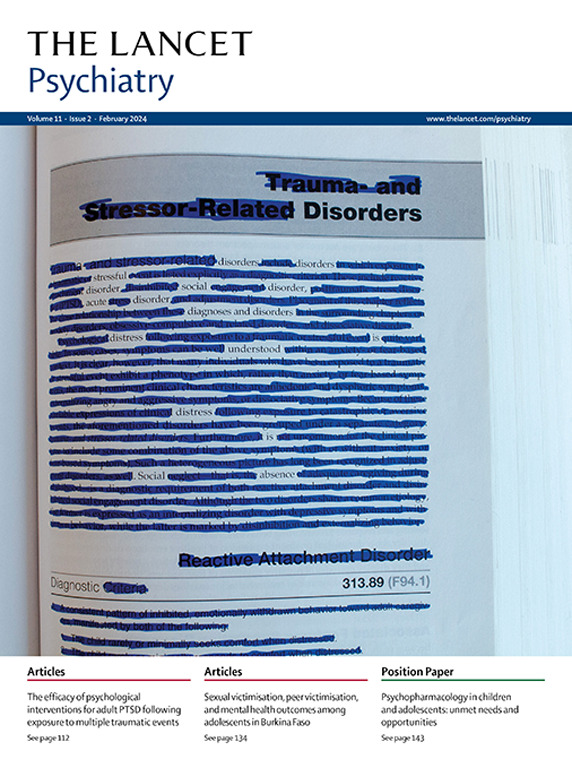Pharmacological treatment of anxiety in older adults: a systematic review and meta-analysis
IF 24.8
1区 医学
Q1 PSYCHIATRY
引用次数: 0
Abstract
Background
Anxiety and its disorders are common in later life. Given the known risks of psychopharmacological treatments in older adults, clinical decision making for anxiety management should be guided by the strongest available evidence. This study aimed to comprehensively synthesise evidence on the pharmacological treatment of anxiety in older adults.Methods
In this systematic review and meta-analysis, we searched MEDLINE, Cochrane Central, Embase, PsycINFO, and CINAHL from database inception to April 23, 2024, for randomised controlled trials on pharmacological treatments for anxiety in older adults (aged 60 years or older, mean age 65 years or older, or subgroup analyses meeting these criteria). Primary outcomes included reduction in anxiety symptoms, or treatment response, or remission. Standardised mean differences (SMD) were calculated for continuous variables and absolute difference and risk ratio (RR) for dichotomous variables. The risk of bias was assessed using the Cochrane Risk of Bias tool, and the certainty of evidence rated using GRADE. People with lived experience were involved in conducting this research. This trial is registered with PROSPERO (CRD42023407837).Findings
We identified 19 eligible studies, including 2336 participants, 1592 (68·15%) of whom were women and 722 (30·91%) men, and sex was not reported for the other 22 (0·94%) participants. Only eight of 19 studies reported on race or ethnicity, and study participants were predominantly White (1309 [91·6%] of 1428), and no studies reported outcomes related to gender. Antidepressants were more effective than placebo or waitlist control in reducing anxiety symptoms (SMD –1·19 [95% CI –1·80 to –0·58), with moderate certainty of evidence and substantial heterogeneity (I2 92·34%; p<0·0001). Antidepressants were also more effective than placebo or waitlist control in response or remission (RR 1·52 [95% CI 1·21 to 1·90]; absolute difference 146 per 1000 [95% CI 59 to 252]); with a low certainty of evidence and low heterogeneity (I2 8·09%; p=0·36). Planned subgroup analysis indicated selective serotonin reuptake inhibitors led to a greater reduction in anxiety symptoms (SMD –1·84 [95% CI –2·52 to –1·17]) compared with serotonin–norepinephrine reuptake inhibitors (SMD –0·46 [95% CI –0·65 to –0·27]), and there was no difference in response or remission. Benzodiazepines might reduce anxiety symptoms compared with placebo, but the evidence is very uncertain with high risk of bias. Meta-analyses for other drug classes for primary outcomes were not possible.Interpretation
Antidepressants are more effective than placebo or waitlist for reducing anxiety symptoms, with evidence supporting their safety and tolerability in older adults. Evidence for the efficacy and safety of benzodiazepines is weak. These findings can guide evidence-based practice.Funding
Public Health Agency of Canada.老年人焦虑的药物治疗:一项系统回顾和荟萃分析
背景:焦虑及其障碍在晚年生活中很常见。鉴于已知的老年人精神药理学治疗的风险,焦虑管理的临床决策应以最有力的现有证据为指导。本研究的目的是全面综合证据的药物治疗焦虑症在老年人。方法在本系统评价和荟萃分析中,我们检索了MEDLINE、Cochrane Central、Embase、PsycINFO和CINAHL,从数据库建立到2024年4月23日,检索了老年人焦虑药物治疗的随机对照试验(年龄在60岁及以上,平均年龄在65岁及以上,或符合这些标准的亚组分析)。主要结局包括焦虑症状减轻、治疗反应或缓解。对连续变量计算标准化平均差(SMD),对二分类变量计算绝对差和风险比(RR)。使用Cochrane偏倚风险工具评估偏倚风险,使用GRADE评价证据的确定性。有生活经验的人参与了这项研究。该试验在普洛斯彼罗注册(CRD42023407837)。结果:我们确定了19项符合条件的研究,包括2336名受试者,其中1592名(68.15%)为女性,722名(30.91%)为男性,另外22名(0.94%)受试者未报告性别。19项研究中只有8项报告了种族或民族,研究参与者主要是白人(1428项研究中有1309项[91.6%]),没有研究报告与性别相关的结果。抗抑郁药在减轻焦虑症状方面比安慰剂或候补对照更有效(SMD - 1.19 [95% CI - 1.80 ~ - 0.58),证据确定性中等,异质性显著(i92·34%;术;0·0001)。抗抑郁药在缓解或缓解方面也比安慰剂或候补对照更有效(RR为1.52 [95% CI为1.21 ~ 1.90];绝对差异146 / 1000 [95% CI 59 ~ 252]);证据确定性低,异质性低(2.08·09%;p = 0·36)。计划亚组分析表明,与血清素-去甲肾上腺素再摄取抑制剂(SMD - 0.46 [95% CI - 0.65至- 0.27])相比,选择性血清素再摄取抑制剂(SMD - 1.84 [95% CI - 2.52至- 1.17])能更大程度地减轻焦虑症状,但在反应或缓解方面没有差异。与安慰剂相比,苯二氮卓类药物可能减轻焦虑症状,但证据非常不确定,有很高的偏倚风险。不可能对其他药物类别的主要结局进行荟萃分析。抗抑郁药在减轻焦虑症状方面比安慰剂或候补药物更有效,有证据支持其在老年人中的安全性和耐受性。苯二氮卓类药物的有效性和安全性证据不足。这些发现可以指导循证实践。加拿大公共卫生局。
本文章由计算机程序翻译,如有差异,请以英文原文为准。
求助全文
约1分钟内获得全文
求助全文
来源期刊

Lancet Psychiatry
PSYCHIATRY-
CiteScore
58.30
自引率
0.90%
发文量
0
期刊介绍:
The Lancet Psychiatry is a globally renowned and trusted resource for groundbreaking research in the field of psychiatry. We specialize in publishing original studies that contribute to transforming and shedding light on important aspects of psychiatric practice. Our comprehensive coverage extends to diverse topics including psychopharmacology, psychotherapy, and psychosocial approaches that address psychiatric disorders throughout the lifespan. We aim to channel innovative treatments and examine the biological research that forms the foundation of such advancements. Our journal also explores novel service delivery methods and promotes fresh perspectives on mental illness, emphasizing the significant contributions of social psychiatry.
 求助内容:
求助内容: 应助结果提醒方式:
应助结果提醒方式:


